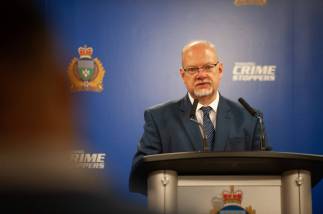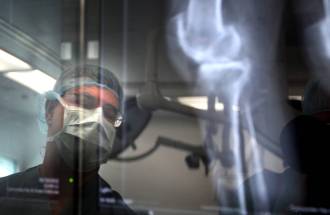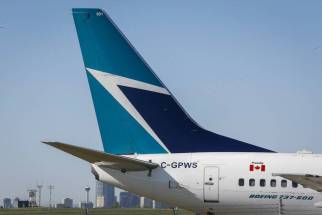Out-of-province surgery won’t fix system, but it’s a good start
Read this article for free:
or
Already have an account? Log in here »
To continue reading, please subscribe:
Monthly Digital Subscription
$0 for the first 4 weeks*
- Enjoy unlimited reading on winnipegfreepress.com
- Read the E-Edition, our digital replica newspaper
- Access News Break, our award-winning app
- Play interactive puzzles
*No charge for 4 weeks then price increases to the regular rate of $19.00 plus GST every four weeks. Offer available to new and qualified returning subscribers only. Cancel any time.
Monthly Digital Subscription
$4.75/week*
- Enjoy unlimited reading on winnipegfreepress.com
- Read the E-Edition, our digital replica newspaper
- Access News Break, our award-winning app
- Play interactive puzzles
*Billed as $19 plus GST every four weeks. Cancel any time.
To continue reading, please subscribe:
Add Free Press access to your Brandon Sun subscription for only an additional
$1 for the first 4 weeks*
*Your next subscription payment will increase by $1.00 and you will be charged $16.99 plus GST for four weeks. After four weeks, your payment will increase to $23.99 plus GST every four weeks.
Read unlimited articles for free today:
or
Already have an account? Log in here »
Hey there, time traveller!
This article was published 25/08/2022 (1200 days ago), so information in it may no longer be current.
There is nothing inherently wrong with sending patients out of province for medical care if they can’t get it here.
The former NDP government did it in the early 2000s. They sent cancer patients to North Dakota for treatment because there wasn’t enough capacity in Manitoba at the time. It was the only way to bring wait times down in the short term. It worked.
The Progressive Conservative government is doing the same today with spinal surgery and, more recently, with orthopedics. The Tories’ diagnostic and surgical recovery task force announced Wednesday a plan to send as many as 750 Manitobans a year out of province for hip and knee surgery. The province signed contracts with clinics in northwestern Ontario, North Dakota and Ohio. Government will pick up the tab for the surgeries, the travel and the accommodation costs.
Critics such as NDP Leader Wab Kinew and the Manitoba Health Coalition say government should find alternatives to sending patients out of province. If it were only that easy. Hospitals are now doing more hip and knee surgeries than they did prior to the COVID-19 pandemic. The four hospitals in Manitoba that perform hip and knee surgeries (Concordia and Grace hospitals, Brandon Regional Health Centre and Boundary Trails Health Centre) performed a combined 518 hip and knee surgeries in June. That’s the second-highest number of procedures completed in any month in at least five years. It’s well above the 379 hip and knee surgeries performed in June 2019, prior to the pandemic.
If sending some patients out of province means several hundred people a year won’t have to wait as long in agony for orthopedic surgery, that’s a good thing.
If sending some patients out of province means several hundred people a year won’t have to wait as long in agony for orthopedic surgery, that’s a good thing.
It’s not a silver bullet. There’s no guarantee Manitoba will reach the estimated 750 out-of-province procedures. The program is expected to start small and may increase to more than 60 patients a month. However, patients have to be willing to travel and they have to be relatively healthy, according to the task force’s criteria.
Eligible candidates have to be of normal weight (overweight patients have a higher risk of complications after surgery) and cannot have a liver, kidney or blood-vessel condition. They can’t have low iron or a muscle condition such as muscular dystrophy. If they have asthma, diabetes or a heart condition, it must be “well controlled.” All eligible candidates must have at least two doses of a COVID-19 vaccine “to reduce the chance of contracting COVID-19 and its subsequent potential impact on recovery.”
The longer-term solution is to build surgical capacity in Manitoba. The proposed orthopedic surgery expansion at Concordia Hospital, originally slated to open by the end of this year, is behind schedule. It’s now expected to open in March 2023. It will add up to 1,000 procedures per year, boosting the province’s pre-pandemic capacity by about 20 per cent.
The province is also looking at doing more day surgeries to increase capacity.
The province is also looking at doing more day surgeries to increase capacity. Right now, about 10 per cent of hip and knee procedures in Manitoba are done that way (where patients return home the same day as their surgery). Day surgeries free up resources that can be used to increase surgical slates. Manitoba does a smaller proportion of day surgeries for hips and knees than many other jurisdictions, according to health officials.
Moving towards more day surgeries could also pave the way for private clinics to start doing hips and knees. Private facilities, which do not typically keep patients overnight, already do thousands of other surgeries per year in Manitoba (such as removing cataracts), where the costs are covered by the province. With demand for orthopedic surgery growing by about five per cent a year, the expanded use of private clinics may be an important part of building capacity in the system.
Even with the historically high number of hip and knee surgeries performed now in Manitoba, wait lists are still growing due to the backlog created during the pandemic. Health officials estimate the province needs to perform more than 6,000 procedures a year to reduce wait times (Manitoba completed a record 5,049 hip and knee procedures in 2019 before the pandemic hit). If hospitals continue to do about 500 surgeries per month as they did in June, that goal is not far off. The out-of-province surgeries might just make the difference.
tom.brodbeck@freepress.mb.ca

Tom has been covering Manitoba politics since the early 1990s and joined the Winnipeg Free Press news team in 2019.
Our newsroom depends on a growing audience of readers to power our journalism. If you are not a paid reader, please consider becoming a subscriber.
Our newsroom depends on its audience of readers to power our journalism. Thank you for your support.








